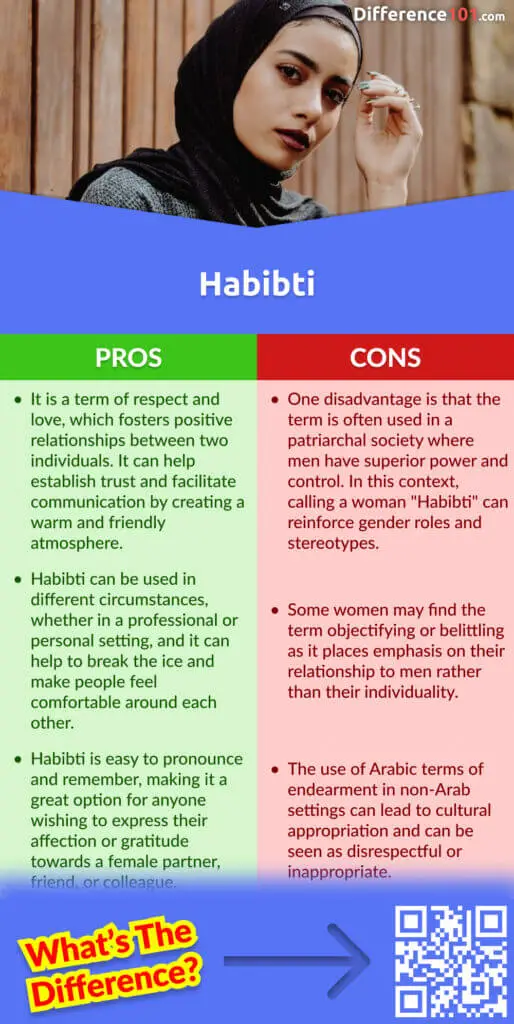The Arabic language is known for its rich vocabulary, and one of its most fascinating aspects is the use of endearing terms to express love and affection. Two such terms that are commonly used in Arabic are “habibi” and “habibti”. However, while these two words may sound similar, they have distinct meanings and uses that set them apart.
For those not familiar with Arabic, it can be easy to assume that “habibi” and “habibti” are simply the same term of endearment for males and females, respectively. However, a closer look reveals that there are some noteworthy differences that anyone interested in learning about Arabic culture should know.
This blog post will delve deeper into the nuances of the terms “habibi” and “habibti”, exploring their origins, meanings, and contexts of use. Whether you’re planning a trip to an Arabic-speaking country, or simply looking to expand your knowledge of other languages and cultures, this post aims to be a valuable resource.
Table of Contents
What Is Habibi?

Habibi is an Arabic term of endearment used to address a male. The word is derived from the root “habib” which means beloved or dear. It is a common greeting among Arab speakers and is often used among close friends, family members, and romantic partners. The term is not exclusive to any particular religion or culture and is widely used across the Middle East and North Africa. Habibi is commonly used in conversation as a sign of affection and respect, and is often paired with other terms of endearment such as “ya” or “my”. Its meaning transcends gender and age, and is a universal expression of love and friendship.
What Is Habibti?

Habibti is an Arabic term of endearment for a female. It is a commonly used word by people from different Arabic speaking countries to express their love and affection towards their female loved ones, such as mothers, daughters, sisters, partners, and friends. The word Habibti is derived from the Arabic root word ḥ-b-b which means love. It is typically used as a term of endearment to address a female person in a formal or informal context. The use of Habibti is an amazing way to show respect and love towards the female gender, and it is a wonderful way to acknowledge the importance of the Arabic language and culture.
Key Differences Between Habibi And Habibti
Habibi and Habibti are two Arabic terms of endearment commonly used to express love or affection towards a male and female respectively. While both terms share similar meanings, there are some key differences in terms of pronunciation and usage. Habibi is used to address a male loved one, including friends, family, or a significant other. In comparison, Habibti is specifically used to address a female loved one, including female friends, family, or a significant other. The difference in pronunciation is subtle, with Habibi being pronounced as “ha-bee-bee” and Habibti as “ha-beeb-tee”. Understanding these differences can ensure individuals use the appropriate term of endearment when expressing their affection towards their loved ones in Arabic-speaking cultures.
Habibi vs. Habibti Similarities
Habibi and Habibti are both Arabic terms of endearment that are commonly used to express affection towards a male and female, respectively. They are derived from the Arabic root word “habib,” which means “beloved” and reflects deep love and affection. Both terms are widely used in the Arabic language by lovers, friends, and family members to express their bond and closeness. Both Habibi and Habibti carry a similar emotional connotation and are often used interchangeably. Additionally, both terms are used to signify respect towards the person being addressed. Overall, these terms serve as beautiful and powerful expressions of love and affection in the Arabic culture and are widely used to create an emotional bond between individuals.
- Both are common Arabic terms of endearment for male and female.
- Both are derived from the Arabic root word “habib,” which means “beloved” and reflects deep love and affection.
- Both terms are widely used in the Arabic language by lovers, friends, and family members to express their bond and closeness.
- Both terms are used to signify respect towards the person being addressed.
Habibi vs. Habibti Pros and Cons
Habibi Pros & Cons

Habibi Pros
Habibi is an Arabic term of endearment used to refer to a male loved one, whether a friend, partner, or family member. This word has several advantages and pros that make it a popular choice among native Arabic speakers. Firstly, it is a versatile term that can be used in multiple contexts, whether it’s a casual conversation or a more intimate one. Secondly, it conveys a sense of warmth and affection, creating a positive emotional connection between individuals. Additionally, Habibi reflects the importance of close relationships in Arab culture, emphasizing the value of family and friendships. Overall, Habibi is an invaluable term that reinforces social bonds and promotes a sense of community within Arabic-speaking societies.
- It is a versatile term that can be used in multiple contexts, whether it’s a casual conversation or a more intimate one.
- It conveys a sense of warmth and affection, creating a positive emotional connection between individuals.
- It reflects the importance of close relationships in Arab culture, emphasizing the value of family and friendships.
Habibi Cons
The use of the term “Habibi” as an Arabic term of endearment for a male has its disadvantages and cons. One major disadvantage is that it may be perceived as inappropriate or disrespectful if used in a professional setting or when addressing someone of seniority. Additionally, in some cultures, using “Habibi” may be considered too informal or overly familiar and may lead to misunderstandings or offense. Another disadvantage is that the term may reinforce gender stereotypes and restrict the expression of love and affection within male relationships. Moreover, the overuse or misuse of “Habibi” may diminish its true meaning and significance, reducing its emotional impact.
- One major disadvantage is that it may be perceived as inappropriate or disrespectful if used in a professional setting or when addressing someone of seniority.
- In some cultures, using “Habibi” may be considered too informal or overly familiar and may lead to misunderstandings or offense.
- The term may reinforce gender stereotypes and restrict the expression of love and affection within male relationships.
Habibti Pros & Cons

Habibti Pros
The Habibti, which is an Arabic term of endearment for a female, has several advantages and pros. First and foremost, it is a term of respect and love, which fosters positive relationships between two individuals. It can help establish trust and facilitate communication by creating a warm and friendly atmosphere. Additionally, Habibti can be used in different circumstances, whether in a professional or personal setting, and it can help to break the ice and make people feel comfortable around each other. Moreover, Habibti is easy to pronounce and remember, making it a great option for anyone wishing to express their affection or gratitude towards a female partner, friend, or colleague.
- It is a term of respect and love, which fosters positive relationships between two individuals. It can help establish trust and facilitate communication by creating a warm and friendly atmosphere.
- Habibti can be used in different circumstances, whether in a professional or personal setting, and it can help to break the ice and make people feel comfortable around each other.
- Habibti is easy to pronounce and remember, making it a great option for anyone wishing to express their affection or gratitude towards a female partner, friend, or colleague.
Habibti Cons
While the use of the term “Habibti” may seem affectionate and harmless, it is important to understand the potential negative effects it can have. One disadvantage is that the term is often used in a patriarchal society where men have superior power and control. In this context, calling a woman “Habibti” can reinforce gender roles and stereotypes. Additionally, some women may find the term objectifying or belittling as it places emphasis on their relationship to men rather than their individuality. Furthermore, the use of Arabic terms of endearment in non-Arab settings can lead to cultural appropriation and can be seen as disrespectful or inappropriate. It is important to be mindful of the potential negative implications of using terms like “Habibti” and strive to promote equality and respect in all interactions.
- One disadvantage is that the term is often used in a patriarchal society where men have superior power and control. In this context, calling a woman “Habibti” can reinforce gender roles and stereotypes.
- Some women may find the term objectifying or belittling as it places emphasis on their relationship to men rather than their individuality.
- The use of Arabic terms of endearment in non-Arab settings can lead to cultural appropriation and can be seen as disrespectful or inappropriate.
Comparison Table: 7 Key Differences Between Habibi And Habibti
| Components | Habibi | Habibti |
|---|---|---|
| Language | Arabic | Arabic |
| Meaning | “My beloved” (masculine form) | “My beloved” (feminine form) |
| Gender | Masculine | Feminine |
| Usage | Addressing a male | Addressing a female |
| Affectionate | Can be used for friends, family or romantic partners | Can be used for friends, family or romantic partners |
| Examples | “Ana bahibbak ya habibi.” | “Ana bahibbik ya habibti.” |
| Translation | “I love you, my beloved.” | “I love you, my beloved.” |
Comparison Chart

Comparison Video
Conclusion: What Is The Difference Between Habibi And Habibti?
In conclusion, the terms “habibi” and “habibti” are both Arabic terms of endearment that are commonly used to show affection and love. The main difference between the two is that “habibi” is used for males, while “habibti” is used for females. It’s important to note that these expressions of affection are not limited to use between romantic partners, and are often used between family members and close friends as well. Understanding the difference between the terms “habibi” and “habibti” can help non-Arabic speakers navigate conversations and relationships with Arabic-speaking individuals in a respectful and affectionate manner.







